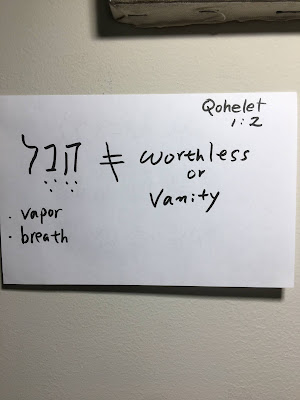Thursday, August 26, 2021
"Race, Ethnicity and the Gospels"
Sunday, August 22, 2021
Wisdom from Qohelet (Ecclesiastes)
Friday, August 20, 2021
Confucius and his legacy
Confucius's Golden Rule:
Zi Gong asked: “Can you summarize with one word how we should live in our whole life? Confucius said, “Isn't it empathy or mercy? Do not impose on others what you do not wish for yourself" (Analects 15:24).子貢問曰。有一言而可以終身行之者乎。子曰。其恕乎。己所不欲、勿施於人。
Interesting:
-Hillel: "What is hateful to you, do not do to others; all the rest is commentary" (Shabbat 31a).
-Jesus: “In everything do to others as you would have them do to you; for this is the law and the prophets" (Matt 7:12).
Five Analects of Confucius (source):
“Respect yourself and others will respect you.”
“Hold faithfulness and sincerity as first principles.”
“To be wealthy and honored in an unjust society is a disgrace.”
“Never give a sword to a man who can't dance.”
“The noble-minded are calm and steady."
Four Books
Great Learning (or alternative)
The Doctrine of the Mean (or alternative)
Analects (or alternative)
Mencius (or alternative)
"Five behaviors of the gentleman most central to the Analects are benevolence (ren 仁), righteousness (yi 義), ritual propriety (li 禮), wisdom (zhi 智), and trustworthiness (xin 信)" (Stanford Encyclopedia of Philosophy).
측은지심(惻隱之心) : 어려움에 처한 사람을 애처롭게 여기는 마음을 뜻한다.
수오지심(羞惡之心) : 의롭지 못함을 부끄러워 하고, 착하지 못함을 미워하는 마음을 뜻한다.
사양지심(辭讓之心) : 겸손하여 남에게 사양할 줄 아는 마음을 뜻한다.
시비지심(是非之心) : 옳고 그름을 판단할 줄 아는 마음을 뜻한다.
광명지심(光名之心): 중심을 잡고 항상 가운데 바르게 위치해 밝은 빛을 냄으로써 믿음을 주는 마음이다.
Thursday, August 19, 2021
Love in Confucianism
In the Doctrine of the Mean (one of the Four Books in Confucianism), there is an important phrase that represents Confucius's main thought: 仁者人也 (rén zhě rén yě). See the following calligraphy I wrote. This phrase may be translated as "To love is to become the person." By the way, love (Ren in Chinese: 仁) appears frequently, 106 times, in the Analects of Confucius. The question is: What is Ren or love according to Confucius or how do we interpret it?
*Four Books and Five Classics:
Monday, August 16, 2021
Three moments of human experience and transformation
Thursday, August 12, 2021
Liberate the Bible
Strictly speaking, the Bible does not talk to us. The Bible does not mean, but we (as readers) mean with the text. So we need critical engagement with the text, considering various writings in the Bible seriously, and taking a stand on our interpretation.
Authority is not encoded in the text. It is not knowledge or information. It is the power of God that transforms people and the world. It becomes the catalyst for a new humanity. Through the reader's conscientious engagement, the authority of the scriptures may come alive. That is, through our endless, careful interpretation, the word of God for our time can be unlocked, activated, and communicated to the world.
Tuesday, August 10, 2021
Eccl 3:1-8 and Hebel
For everything there is a season, and a time for every matter under heaven:
2 a time to be born, and a time to die;
a time to plant, and a time to pluck up what is planted;
3 a time to kill, and a time to heal;
a time to break down, and a time to build up;
4 a time to weep, and a time to laugh;
a time to mourn, and a time to dance;
5 a time to throw away stones, and a time to gather stones together;
a time to embrace, and a time to refrain from embracing;
6 a time to seek, and a time to lose;
a time to keep, and a time to throw away;
7 a time to tear, and a time to sew;
a time to keep silence, and a time to speak;
8 a time to love, and a time to hate;
a time for war, and a time for peace.
Eccl 3:1-8 should not be understood as fixing God's individual plan for each person. Qohelet does not talk about determinism, so to speak. Hebel (vapor/breath) presupposes all kinds of uncertainties and possibilities in our lives. That is, anything can happen to anyone anytime, be it good or bad. The life of hebel is reminiscent of the Buddhist teaching of annica, which means everything changes. Likewise, there is another similar teaching of Buddhism, which is dukkha ("all are involved in suffering"). While Buddha focuses on suffering, the sheer reality is we live a life of pain and suffering because we are hebel--which is nothing wrong. We need to accept who we are in light of hebel. Do not bother with many things that are not going well. Rather, focus on yourself from a bigger, godly perspective and live a simple life.
전도서에서 "헤벨"(hebel)의 인생은 결국 불교적으로 표현하면 제행무상(諸行無常)과 일체개고(一切皆苦)와 관련이 있다. 모든 것이 변한다. 만사에 고통이 있다. 전도서에서 만사에 때가 있다는 것이 개별적으로 미리 정해진 운명이 있다는 뜻이 아니라 여러가지 일이 다양하게 일어나며 나의 통제안에 있지 않음을 말한다. 그러니 어떤 개별 사건에 너무 집착말고 크게 보고 나에게 집중하고 소박하게 살라는 것이 전도서의 교훈이 아닐까.hebel is not the same as a worthless or useless thing
The issue is how we understand things that exist and disappear, including humans. Ecclesiastes (Qohelet) talks about this. However, many misunderstand "hebel" in Eccl 1:2 and translate it as vanity. The literal meaning of the word is vapor or breath. Vapor represents something evanescent. But simply because something is short-lived or disappears eventually, that does not mean that something is useless or vanity. What is discussed in Qohelet is the sheer reality of not-permanent-being. The question is then: How should we live with this reality that seems to be vanity?
I posted a piece of writing on my wall to remind me of this lifelong question.







